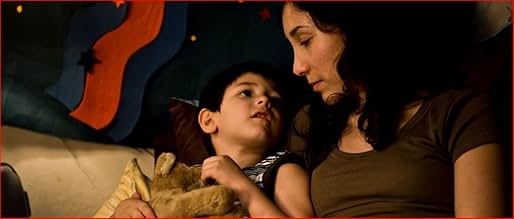ÉVALUATION IMDb
7,5/10
5,7 k
MA NOTE
Ajouter une intrigue dans votre langueUmay is a young woman of Turkish descent, fighting for an independent and self-determined life in Germany against her family's resistance. Her struggle initiates a dynamic that results in a ... Tout lireUmay is a young woman of Turkish descent, fighting for an independent and self-determined life in Germany against her family's resistance. Her struggle initiates a dynamic that results in a life-threatening situation.Umay is a young woman of Turkish descent, fighting for an independent and self-determined life in Germany against her family's resistance. Her struggle initiates a dynamic that results in a life-threatening situation.
- Prix
- 30 victoires et 14 nominations au total
Gümeç Alpay Aslan
- Zeynep
- (as Gümec Alpay)
Avis en vedette
The film she she is a victim of the traditional culture, in the cultural system of human nature, she just husband and home accessories, and is never her own most of the world are all traditional male-dominated roles if which day I hope the human progress in addition to the increasingly advanced technology and the trend of men's and women's position is equal
Umay leaves her abusive husband Kemal in Istanbul with her son Cem to go home to Germany. Her father Kader is concerned about the family's honor. The older brother Mehmet is angry. The youngest brother Acar is scared but kind. Kemal rejects Umay but wants his son Cem back. As Kader and Mehmet try to force the situation, Umay calls the police and she escapes with Cem to a women's shelter. She finds a job with a supportive boss and a new boyfriend. Her younger sister Rana is rejected by her fiancee's father due to the situation. Rana tells her mother that she's desperate to marry Duran because she's secretly pregnant. Kader has to pay off the father to get them married. Umay shows up unexpectedly at the wedding and has a meltdown. Even Acar is forced to confront the lost of family honor.
The portrait of the lost of family honor is devastating. The pressure feels real. The need for Umay to reconnect with her family does feel unreasonable and excessive. I doubt a reasonable Umay would show up at the wedding. After the wedding, it seems impossible for her to go to the hospital especially carrying her son with her. Then the final scene has too many twists. It only accentuates the twisty manufactured nature of the writing. Writer/director Feo Aladag needs to tone down some of the more melodramatic developments in the last act.
The portrait of the lost of family honor is devastating. The pressure feels real. The need for Umay to reconnect with her family does feel unreasonable and excessive. I doubt a reasonable Umay would show up at the wedding. After the wedding, it seems impossible for her to go to the hospital especially carrying her son with her. Then the final scene has too many twists. It only accentuates the twisty manufactured nature of the writing. Writer/director Feo Aladag needs to tone down some of the more melodramatic developments in the last act.
The basic plot is simple: a young lady with a crazy in-laws feds up and leaves making her a total outcast. The acting seemed a bit too dramatic and overly polished. The actors are obviously talented and have done their best, but it showed that they were trying too hard, which took away the realism I was anticipating. More than a few scenes were simply yelling and slapping which I've found quite raw. The close-ups were nice generally with beautiful faces, occasionally with oblique views. At times, when we were shown a scene with people staring at each other silently which meant that the discussion was over, I wondered if that was really the case and not if we were witnessing a zen moment. As a side note, I just have to point out that the subject of film has little to do with religion or being a "muslim". The problem is far too deep which is really a sociological phenomena rooted in dogmatic cultural upbringings and a feudal life style (mostly) of the eastern part of country where people are just a dot in the family picture rather than individuals with autonomy. You could see that nobody in the family wanted to be a part of what was going on but they could not behave otherwise -- they were slaves of their communities even thousands of miles away.
Within 30 seconds of the film's opening scene, we know we're entering a complex, and very real world.
Later we see Umay, our lead character, lying on a doctor's table and we immediately fall in love with her. There is something magical and loving about the way the camera moves around her. That's all the character development we need, but this heroine (and I mean this in a literal sense; Umay, to me, is a hero in the best sense of the word) continues to evolve and reveal amazing traits in a complicated situation that mere mortals would fold under.
This Turkish film is about familial bonds, deep and abiding love and human rights. It attempts to bridge the gap between traditional cultures and their inherent focus on family as one's primary means of survival, and post-industrial (Western) culture in which human rights and dignity are of paramount importance.
'When We Leave' reminds us westerners of what we sacrificed in the name of economic and political progress while illuminating what is now, to us, a little-understood truth: The "Old Days" weren't always "The Good old Days."
I cannot recommend this film highly enough. Sibel Kekilli's performance as Umay must be the finest role, male or female, of the entire year. And what a face! One could watch the entire film with no audible dialog and be transfixed throughout by this wonderful actor's countenance. Too bad she won't be considered for a Oscar!
Later we see Umay, our lead character, lying on a doctor's table and we immediately fall in love with her. There is something magical and loving about the way the camera moves around her. That's all the character development we need, but this heroine (and I mean this in a literal sense; Umay, to me, is a hero in the best sense of the word) continues to evolve and reveal amazing traits in a complicated situation that mere mortals would fold under.
This Turkish film is about familial bonds, deep and abiding love and human rights. It attempts to bridge the gap between traditional cultures and their inherent focus on family as one's primary means of survival, and post-industrial (Western) culture in which human rights and dignity are of paramount importance.
'When We Leave' reminds us westerners of what we sacrificed in the name of economic and political progress while illuminating what is now, to us, a little-understood truth: The "Old Days" weren't always "The Good old Days."
I cannot recommend this film highly enough. Sibel Kekilli's performance as Umay must be the finest role, male or female, of the entire year. And what a face! One could watch the entire film with no audible dialog and be transfixed throughout by this wonderful actor's countenance. Too bad she won't be considered for a Oscar!
After seeing this film, I assumed it was directed by a Turkish director named Feo Aladag. When I googled this name, a picture of a young blond woman filled the screen. As it turned out, Feo Aladag is an Austrian actress/director, married to Turkish/German author Zuli Aladag, who is also the producer of Die Fremde.
I mention this because I think it is important. In this film, the Turkish community in Germany is not pictured in a very favourable way. The story shows the fate of Umay, a young Turkish/German woman who wants a divorce because her husband beats her and because, perhaps more importantly, she doesn't love him. She leaves her husband and moves with her young son to her family in Berlin. Surprisingly, her father and brother take sides with her husband and urge her to return to him. In their view, she has dishonoured her husband and her own family by separating her son from his father. This conflict escalates in a dramatic way, with terrible consequences.
The film pictures Umay as a woman who is denied her 'Western' rights as a woman and a mother, and shows her family as driven by 'non-Western' values like honour and tradition. For them, the community is superior over the individual. For her, it's the other way round.
The message is pessimistic. Umay is a Turkish woman who adopts the German lifestyle. She wants to live her own life. She follows the integration model that the Turkish people in Western Europe are supposed to follow. But her brother and sister don't support her, although they are born and raised in Germany. They speak the German language, but think the Turkish way.
Like some of the films of Faith Akin (in which lead actress Sibel Kekilli also starred) this film focuses on the problems of the Turkish community in Germany. But it has a darker and more pessimistic tone. It's a very powerful movie, dealing with a very urgent issue.
I mention this because I think it is important. In this film, the Turkish community in Germany is not pictured in a very favourable way. The story shows the fate of Umay, a young Turkish/German woman who wants a divorce because her husband beats her and because, perhaps more importantly, she doesn't love him. She leaves her husband and moves with her young son to her family in Berlin. Surprisingly, her father and brother take sides with her husband and urge her to return to him. In their view, she has dishonoured her husband and her own family by separating her son from his father. This conflict escalates in a dramatic way, with terrible consequences.
The film pictures Umay as a woman who is denied her 'Western' rights as a woman and a mother, and shows her family as driven by 'non-Western' values like honour and tradition. For them, the community is superior over the individual. For her, it's the other way round.
The message is pessimistic. Umay is a Turkish woman who adopts the German lifestyle. She wants to live her own life. She follows the integration model that the Turkish people in Western Europe are supposed to follow. But her brother and sister don't support her, although they are born and raised in Germany. They speak the German language, but think the Turkish way.
Like some of the films of Faith Akin (in which lead actress Sibel Kekilli also starred) this film focuses on the problems of the Turkish community in Germany. But it has a darker and more pessimistic tone. It's a very powerful movie, dealing with a very urgent issue.
Le saviez-vous
- AnecdotesGermany's official submission for the Best Foreign Language Film Award at the 83rd Annual Academy Awards in 2011.
- ConnexionsFeatures Biçak Sirti (2007)
- Bandes originalesSO 36 - Party
Performed by Steffen Irlinger & Marian Mülle
(P) 2010 Colosseum Music Entertainment GmbH
Meilleurs choix
Connectez-vous pour évaluer et surveiller les recommandations personnalisées
- How long is When We Leave?Propulsé par Alexa
Détails
Box-office
- Brut – États-Unis et Canada
- 19 631 $ US
- Fin de semaine d'ouverture – États-Unis et Canada
- 6 018 $ US
- 30 janv. 2011
- Brut – à l'échelle mondiale
- 1 338 132 $ US
- Durée1 heure 59 minutes
- Couleur
- Mixage
- Rapport de forme
- 2.35 : 1
Contribuer à cette page
Suggérer une modification ou ajouter du contenu manquant

Lacune principale
By what name was Die Fremde (2010) officially released in India in English?
Répondre

























